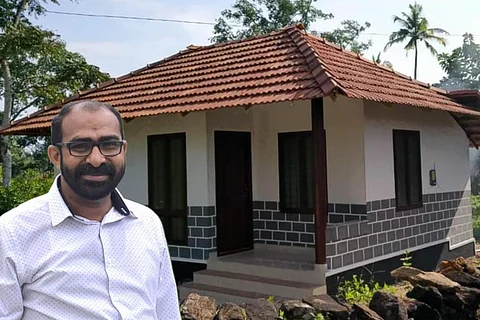

When Kerala witnessed the worst flood of the century in 2018 and many lost their homes, a safe roof to live under was their only concern next. In fact, Father Jijo Kurian, a priest living in a monastery in Idukki district, realised this when he was on a rescue mission during the 2018 floods. Moved by the plight of families who were struggling to live in a secure place, Father Jijo and his friends started building small, low-cost and beautiful cabin houses for small families.
"I saw a woman living in a shed with tin sheets as the roof and walls. It was raining at the time, which resulted in leaking. I wanted to build a small house for her, a house without any leakage. I discussed it with my friends. We managed to raise Rs 1.5 lakh through various sponsors and built a cabin house for her," said Fr Jijo, as he explained how he began the initiative.
Father Jijo, who hails from Natukani of Idukki, initially started the initiative only in the district. Later, he and his team extended their service to other districts, too. In two years, the team built more than 100 cabin houses, which materialised with the help of many like-minded people.
People who cannot get a home under government schemes form the beneficiaries for Fr Jijo's cabin houses. "People with disabilities, who don’t have anyone else to support, elderly people, people with illnesses, a family with only one or two breadwinners and those who are not able to make ends meet are selected as beneficiaries," he told TNM. Fr Jijo and his team visit each family in need to verify if they are deserving candidates. The houses are 300 square feet and built on two cents of land or more.
Each house will have a bedroom, kitchen, hall, bathroom and verandah. It would cost around Rs 1.5 to 2.5 lakh. For a bigger family, the house will have two bedrooms, built at a cost of Rs 2 to Rs 4 lakh. They use tiles for the roof, cement blocks for basement, steel pipes and fibre cement boards for walls to construct these cabin houses.
These houses are durable like any other houses, if maintained properly. The cabin houses are designed for solid terrains. In marshy land, families are asked to construct a foundation suitable for that environment and then build the cabin house over it.
"Many people have approached me, offering to financially help build the house. So we connect the sponsor directly to the beneficiary. We haven't done any fundraising programmes yet," he said.
Usually, a sponsor will completely fund the construction of the house. However, there are cases where the beneficiaries also chip in to reduce the burden on the sponsor. Some charity organisations, too, step in to fund the project.
“We have formed five teams of social workers who will oversee the construction. Masons and other workers are locally sourced. About five to seven houses are built in a month," he added.
Father Jijo, however, said that though they receive many requests, they are not able to meet them all. “We cannot travel a long distance and construct houses as we plan for low-budget houses. We cannot spend more on travel and other expenses," he explained. So at times, due to shortage of manpower, the team is unable to accept requests from far away places.
According to Fr Jijo, they have not faced any major challenges in the mission as many kind-hearted people have helped them. However, an unexpected hike in the price of the materials and unplanned expenses are some of the small challenges that they sometimes encounter along the way.
“This mission moves ahead with some liabilities. Such construction projects can be done only as a social service because this is not a business venture that anybody can get profit out of," said Fr Jijo, adding, "The sponsor usually gives a fixed amount. However, unexpected expenses get us into financial trouble. But some friends and strangers offer to help us."